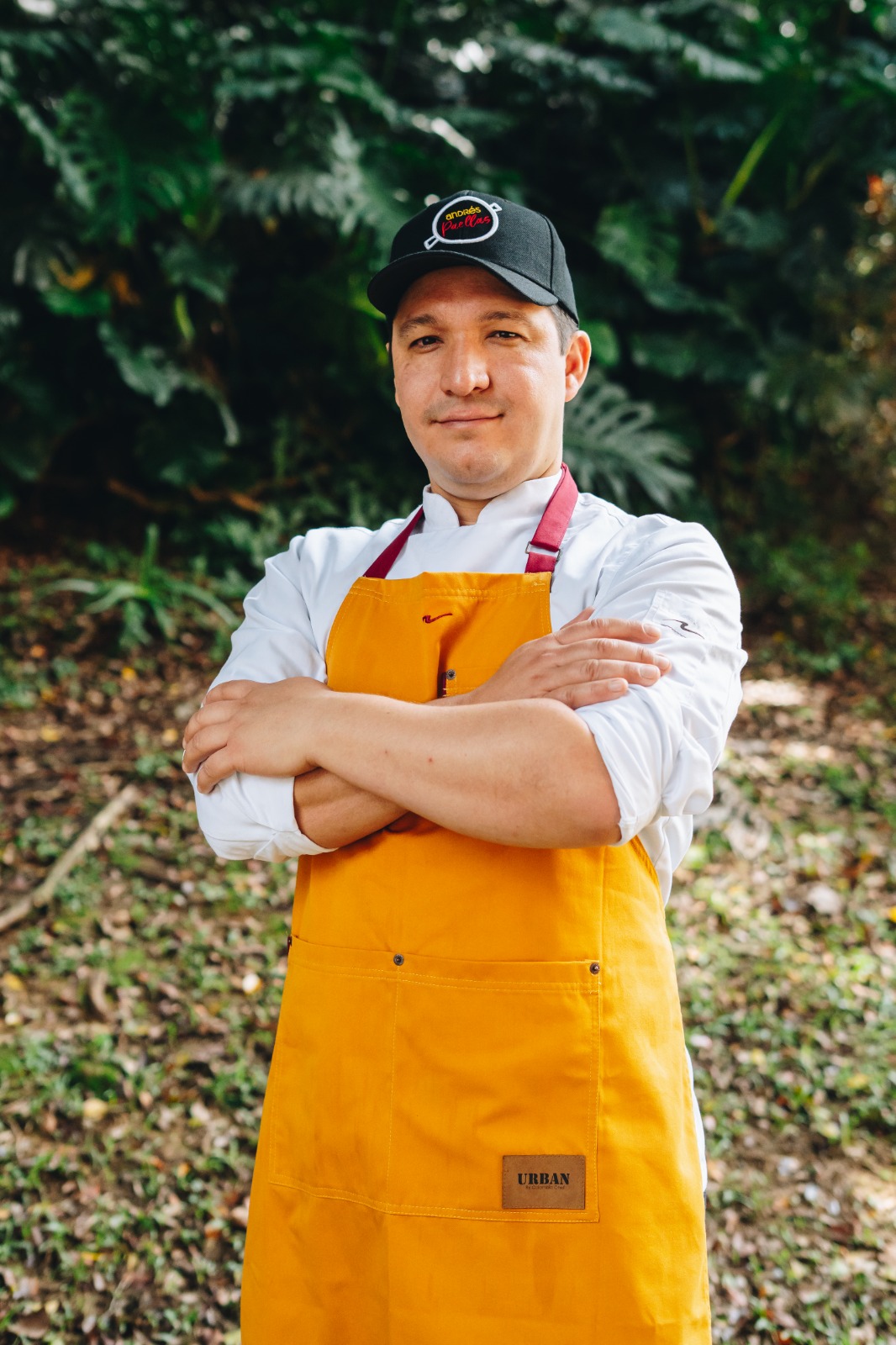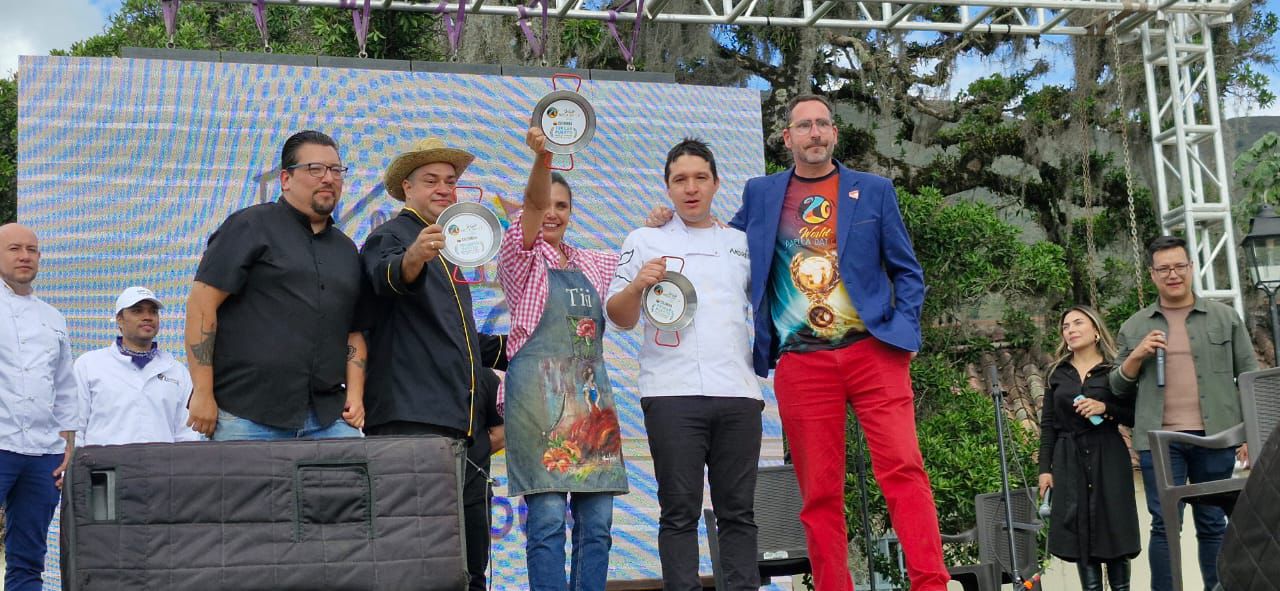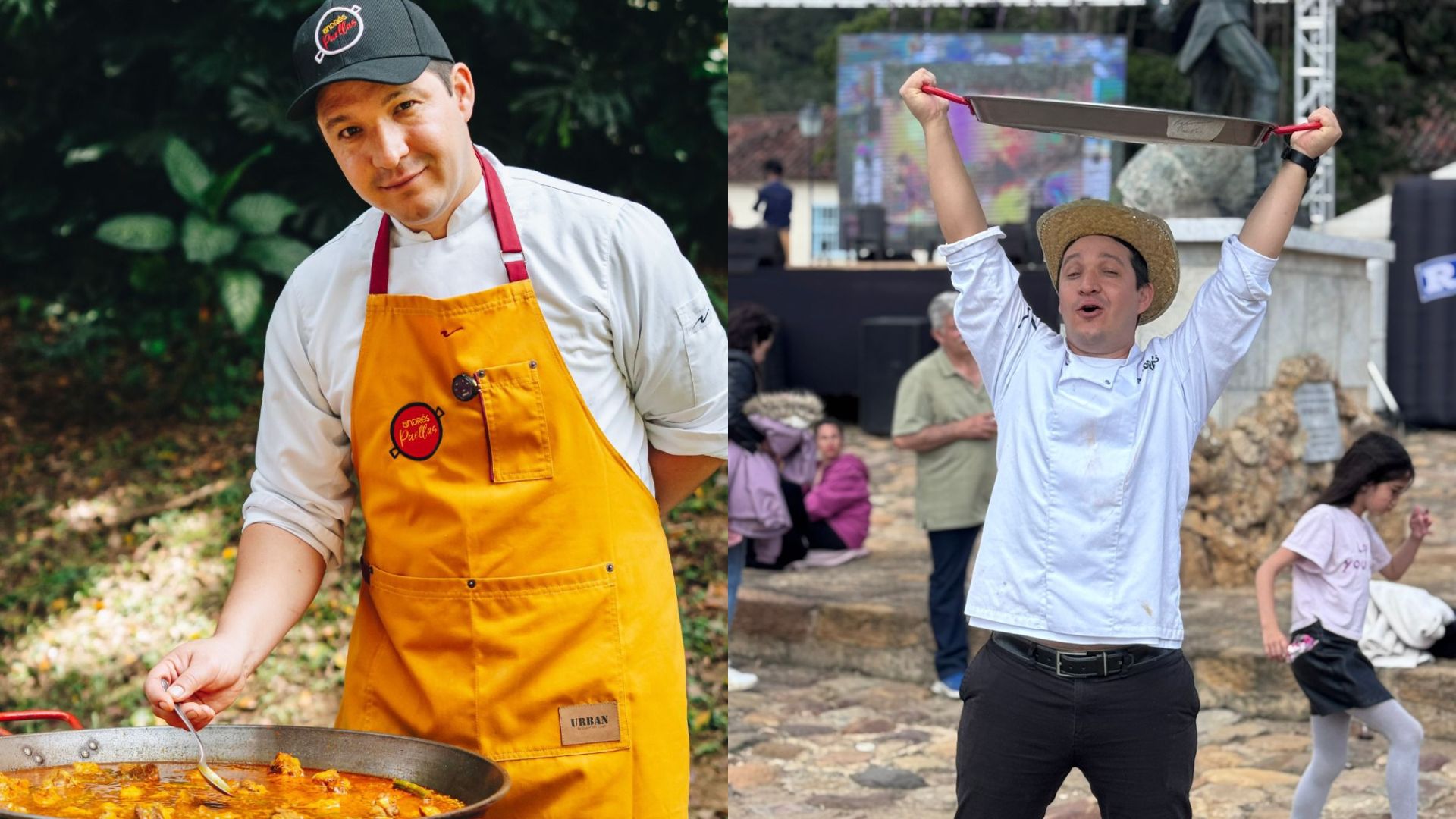The physiotherapist and dog trainer who wants to be the world's best paella chef with his Colombian flavor.

The first time he prepared a paella was in Spain, using a digital pressure cooker, an unusual utensil for cooking this typical Valencian dish. “We bought a packaged paella and cooked it in eight minutes. Honestly, it didn't taste good. It was my first attempt, but the flavor wasn't pleasant,” Andrés Felipe Otálvaro, a chef who will represent Colombia at the World Paella Day Cup, told EL TIEMPO. The event, which will take place in that European country on September 20th and aims to crown the best paella cook in the world, will take place there.
Otálvaro is from Medellín but proudly says his parents are from the municipality of Abejorral, in Antioquia. “It's a very regional culture where people ate almost exclusively beans, arepas, and bandeja paisa. I wanted to go further,” the Colombian chef reflects as he prepares to offer a tasting of his paella at the Cinco y Quince restaurant in Bogotá.
He looks eager and tells his life story with joy. His happiness is so great that at times during the interview, he doubts he's truly the king of paella in Colombia, after members of the Spanish competition visited the country to conduct the national qualification for the first time.

Andrés Felipe Otálvaro founded a family business that provides catering services. Photo: Courtesy
Miguel Ángel Pérez, representative of Visit Valencia, explains to EL TIEMPO how the World Paella Day Cup was created.
“ Eight years ago, in 2018, International Paella Day was created on September 20th , with a main event in Valencia's Town Hall Square where paellas from different regions of the Valencian Community were cooked. In 2020, due to the pandemic, in-person events were canceled, and the World Paella Day Cup was born, a 100% digital competition broadcast from the Mestalla stadium, with voting on social media,” he explains.
In 2021, after the pandemic-imposed hiatus, the event returned to in-person celebrations with strict biosafety measures. In its first editions, Spain took first place, but with the opening to international contestants, the competition took a more global turn. Since then, countries such as France, Japan, and Puerto Rico have stood out and conquered the podium, demonstrating the growing diversity and gastronomic level of this event.
“This year, the competition is hybrid: six finalists will be chosen in in-person events around the world and six in a digital phase, with more than 20 entrants from 10 countries, including Peru, Venezuela, Cuba, Denmark, Korea, the Czech Republic, and Morocco,” explains Pérez, adding that Otálvaro was selected in Villa de Leyva, following a competition last Sunday, May 25.

Andrés Felipe Otálvaro (in white) during the competition in Villa de Leyva. Photo: Courtesy
Otálvaro is a physical therapist, dog trainer, and assistance dog trainer. His passion for cooking—inherited from his father—led him to become a chef. “Since I was a child, I've been interested in international cuisine. I learned from tutorials and family... I made stir-fries, sushi, and then I discovered paella. Like any true Antioquian, rice is a must, and paella is rice taken to another level. Plus, paella represents sharing, like Spaniards do on Sundays with their families,” he recalls.
The first time he went to Spain wasn't exactly to hone his culinary skills, but rather to train as a dog trainer and work with children with disabilities. Rosa, a classmate, was his partner in crime in Málaga (located in the autonomous community of Andalusia) to prepare his first paella using the digital pressure cooker.
“I brought (to Colombia) Albufera rice, olive oil, liquid broth, saffron, and even a paella seasoning in my suitcase. My second paella was in a wok and it was terrible. Then, in Medellín, I bought a paella pan for 100,000 pesos, which at the time seemed very expensive, and I made paella for eight people at home. That's when I started to improve: I tried it with Spanish chorizo and sausages, and little by little I improved,” he explains.
From that moment on, he began a culinary journey to bring his own paella to life, to the point that today, despite not having a restaurant, he has formed a family business that provides catering services.
“We deliver paella to homes or host chef events at home (@andres.paellas on Instagram). People contact me through my website or WhatsApp Business. We quote based on the event and offer a hands-on experience, not just a culinary one. We even offer workshops if the client wants to learn more about the process,” he says.
He believes that although many Colombians are familiar with foreign cuisines, much of the country's culinary richness remains unknown, even to its own inhabitants. From traditional dishes like Chocó's arroz clavado to drinks like mistela, the local gastronomy offers a universe to explore. With this invitation, the chef encourages us to rediscover Colombia through its flavors and recognize the talent of anonymous cooks who, without seeking fame, preserve the soul of Colombian cuisine.
His paella, the winner in Colombia, includes ingredients he can't reveal due to the competition being held in Valencia; however, he ventured to offer some clues.

Andrés Felipe Otálvaro, in addition to being a chef, is a physical therapist. Photo: Courtesy
“ It has ingredients from the Pacific and the Colombian Amazon. I got into the kitchen with excitement, connecting with my roots . I went to Bahía Solano, I went out to sea to fish for tuna with young fishermen, despite having a respect for the water because of an experience my mother had. I also worked with Ticuna indigenous people from the Amazon and used the pirarucú. The paella I won with has a strong Pacific and Amazon flavor,” he explains.
And he adds: "It's Pacific yellowfin tuna and Amazonian pirarucu. And I added a special touch that I won't reveal, because I want to enhance it. I even added a little something extra, because chefs from other countries must already be investigating me."
Before offering a tasting of his paella, the 42-year-old Colombian chef answered some additional questions about the competition and his expectations for the international contest.
The competition takes place during World Paella Day... In Valencia, the competition will be held on September 20th, World Paella Day, a very important date for Valencians. The organizers gather participants eight days beforehand for pre-event activities. Until last year, 12 countries participated; this year, Uruguay and Colombia have already confirmed their participation, and I believe Bulgaria, China, Japan, Mexico, Peru, Portugal, and possibly India will also be participating.
What is the competition like that day? On the day of the competition, we make a first paella in pairs, as if it were a soccer match. For example, Andrés from Bulgaria and I from Colombia make a paella together, and one of us qualifies. The first one is given to the public to taste, and the one who passes advances to the next round. In the finals, each cook makes their own paella, and the first, second, and third place winners are chosen.
Do all the paellas you cook have the same flavor or do they vary? They change. The idea is to surprise the judges. The only fixed conditions are that the pan (the paella) must be 60 cm, rice from the Albufera lagoon, which is a Valencian designation of origin, must be used, and possibly saffron and olive oil. They give you that basic kit, but you choose the rest of the ingredients yourself. Some people have cooked with eel, lionfish, and exotic ingredients.
What did you win by qualifying in Colombia? Is there any prize money? No, not financially. It's simply the classification. The expenses are many, but the most valuable thing is the recognition. It's positioning my brand, even though I'm not a restaurateur. In fact, lately I've been thinking about opening my social media channels, seeking sponsorship—not so much financially, but for example, a cool Colombian T-shirt brand, dressing up like my dad, wearing a backwards sombrero, some Vélez shoes... That's also part of showing our identity.
And in the case of the international competition, is there any cash prize? Not really. But you win a giant trophy and, above all, the prestige. That recognition opens doors. The winner is called from Dubai, for example, to cook a paella for a wedding, all expenses paid. Arturo, for example, told me he made a paella for 150 people at the Hilton. They invite you to give masterclasses at schools like Le Cordon Bleu (France). They don't give you money, but they give you recognition that's worth much more.
What does it mean to you, as a hobby cook, to win and be recognized as the best paella cook in the world? I've shared it with my friends and competitors. In a restaurant, we want people to come back; we use enhancers, scents, psychology... But since I'm in the healthcare sector, I really care about food that's digestible and easy to digest. I'm a physiotherapist, so I have to lead by example. So I merge the two. I want a paella that's not heavy on the stomach, but that tastes incredible. Plus, I want to convey love through what I cook. Just as I like to be well served, I want to give that to others. And that also has to do with family, with what one represents.
Camilo Andrés Peña Castaneda - Editor of Today's Life and Culture
eltiempo

%3Aformat(jpg)%3Aquality(99)%3Awatermark(f.elconfidencial.com%2Ffile%2Fbae%2Feea%2Ffde%2Fbaeeeafde1b3229287b0c008f7602058.png%2C0%2C275%2C1)%2Ff.elconfidencial.com%2Foriginal%2Fe16%2Fbad%2Fa34%2Fe16bada34c7aa473d8427056b95f02c5.jpg&w=3840&q=100)



%3Aformat(jpg)%3Aquality(99)%3Awatermark(f.elconfidencial.com%2Ffile%2Fbae%2Feea%2Ffde%2Fbaeeeafde1b3229287b0c008f7602058.png%2C0%2C275%2C1)%2Ff.elconfidencial.com%2Foriginal%2F1da%2F03e%2F30a%2F1da03e30a1086fc2bae8245bbecb7564.jpg&w=3840&q=100)